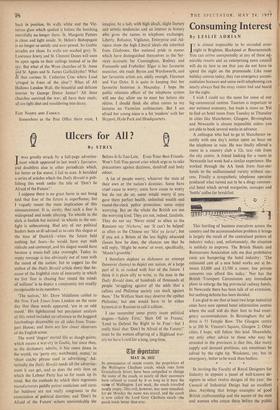Ulcers for All ?
By STRIX WAS greatly struck by a full-page advertise- Iment which appeared in last week's Spectator, and doubtless also in other periodicals which, for better or for worse; I fail to scan. It heralded a series of articles which the Daily Herald is pub- lishing this week under the title of `Don't be Afraid of the Future!'
I suppose there is no great harm in our being told that fear of the future is superfluous; but I vaguely resent the main implication of this announcement. It is, surely, that such a fear is widespread and needs allaying. To whistle in the dark is foolish but natural; to whistle in the sun- light is unbecoming. Had any of our political leaders been so ill-advised as to coin this slogan at the time of Dunkirk—when the future held nothing but fears—he would have met with ridicule and contempt, and his slogan would have become a music-hall joke overnight. Today its soppy message is less obviously out of tune with the mood of the nation; but to suggest (as the author of the Daily Herald article does) that be- cause of the frightful state of insecurity in which we live `fear is chasing fear round the minds of millions' is to depict a community not readily recognisable to its members. • `The natives,' Mr. Drew Middleton cabled to the New York Times from London on the same day that these words appeared, 'are in an odd mood.' His lighthearted but percipient analysis of this mood included no reference to the haggard forebodings discernible on all sides from Trans- port House; and there are few closer observers of the English scene.
The word `slogan' started life as sluagh-gairm, which means a war-cry in Gaelic, but since then, as the dictionary admits, it has come down in the world, via 'party cry, watchword, motto,' to `short catchy phrase used in advertising.' Ad- mittedly the Daily Herald needs all the advertise- ment it can get, and so does the only item on which the Labour Party has so far made up its mind. But the methods by which their ingenious manufacturers peddle patent medicines and cures for baldness are not really congruous to the enunciation of political doctrine; and `Don't be Afraid of the Future' echoes unmistakably the Before-It-Is-Too-Late, Even-Your-Best-Friends- Won't-Tell-You parrot cries which urge us to take precautions against dizziness, dandruff and body odour.
A lot of people worry, whatever the state of their own or the nation's destinies. Some have cruel cause to worry; some have cause to worry but do not do so; some would worry if you gave them perfect health, unlimited wealth and round-the-clock police protection; some enjoy worrying. But on the whole the British are not the worrying kind. They are not, indeed, fatalistic. They do not say `Never mind' as often as the Russians say Wichevo,' nor `It can't be helped' as often as the Chinese say 'Mei yu fa-Ise'; but if you ask a Briton of the less highly educated classes how he does, the chances are that he will reply, `Might be worse' or even, specifically, `Mustn't grumble.'
I therefore deplore as dishonest an attempt (however clumsy) to depict our nation, or a large part of it, as racked with fear of the future. I think it is plain silly to write; as the man in the Daily Herald does, of hundreds of thousands of people `struggling against all the odds that a callous and Philistine society can stack against them.' The Welfare State may deserve the epithet Philistine; but one would have to be either hysterical or Russian to call it callous.
I can remember some pretty inane political slogans—`Safety First,' Hats Off to France,' 'Lend to Defend the Right to be Free'—but 1 really thinl• that `Don't he Afraid of the Future!' must be the wettest offspring of a Highland war- cry we have L.mrd for a long, long time.






























 Previous page
Previous page